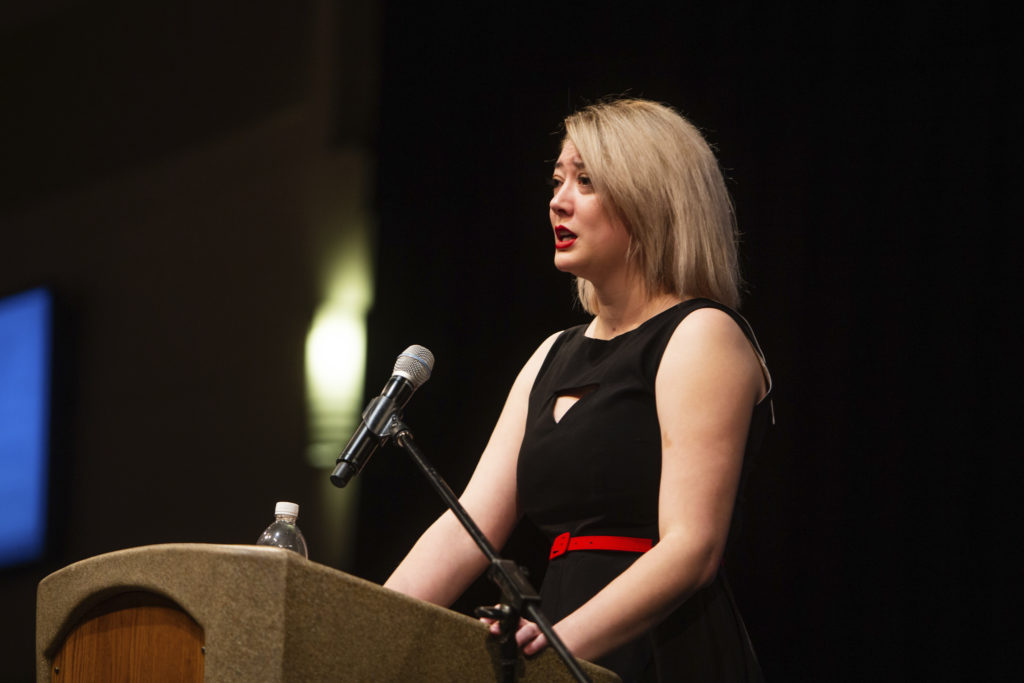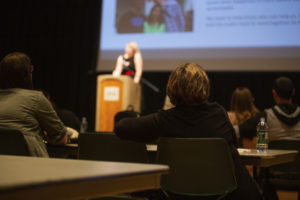
Provo Police Special Victims Unit partnered with UVU and BYU Police to hold a sexual assault workshop April 2 to help provide resources to those impacted by sexual assault.
Mika Scott spoke about being sexual assaulted when she was 19 years old and how the Provo Police Special Victims Unit and the nurses at Utah Valley Hospital helped her recover.
“We got to report so other people don’t suffer too and so that cops can do their job,” Scott said.
Scott said she was lucky she didn’t have a personal connection to her assaulter, adding that 80 to 90 percent of sexual assault victims know their assaulter.
‘It’s a really big decision to tell police. It could change your life,” Scott said.

Scott waited a year for her case to go to trial. She said she is blessed that she didn’t have to wait several years.
BYU Police participated in the event by having Sergeant Elle Martin speak. Martin said she has a passion for educating people about sexual assault.
“I never send a survivor away, no matter where it happened,” Martin said.
Martin said BYU Police want to make the victim feel as comfortable as possible after the incident and that the department will slowly start the investigation process by preserving any potential evidence left on the victim.
Detective Travis Bushman of the Provo Police Special Victims Unit said the unit aims to provide police service proactively and compassionately.
”As a unit we have a victim centered approach, so we’re going to do everything we can and we are willing to do anything the victims want or don’t want,” Bushman said.
Bushman said in many assault reports, the victims don’t want to go through the lengthy court process to prosecute an offender.
Julie Valentine is a forensic nurse for Wasatch Forensic Nurses and a BYU nursing professor. She said she chooses to focus on researching sexual assault to bring attention to the high rate of sexual assault in Utah.
“It all comes down to helping that patient gain a feeling of control again, because sexual assault can take away that feeling of control,” Valentine said.
Valentine said the nurses want to help start the healing process in the medical examination. According to Valentine, when the Wasatch Forensic Nurses started 19 years ago, it was based in a clinic to which hospitals would refer sexual assault victims.
”If a victim reported at a hospital or to police and were told they had to go to a specific clinic,” Valentine said. “They often did not show up, we changed so we’re a mobile team that can go to any hospital.”
According to Valentine, Wasatch Forensic Nurses currently serves Utah and Salt Lake counties, and the nurses are trained to be aware of the victims’ personal space. Valentine and other colleagues of Wasatch Forensic Nurses wrote grant proposals to get funding to test backlogged rape kits after Valentine found in her research that only 38 percent of rape kits were being submitted for testing.
“We were awarded $3.3 million dollars, and pretty much all of those backlogged kits have now been tested,” Valentine said.
Valentine partnered with Rep. Angela Romero, D-Salt Lake City, to work on HB200, a bill signed into law in July 2018 that mandates anyone accused of sexually assaulting someone be tested for HIV and other sexually transmitted diseases.
Valentine and Bushman both said they encourage victims of sexual assault to report the assault, and that even if they don’t want to prosecute their assaulter, it’s important for the police to have a record of the crimes.




